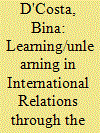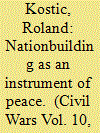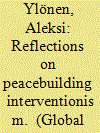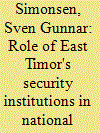|
|
|
Sort Order |
|
|
|
Items / Page
|
|
|
|
|
|
|
| Srl | Item |
| 1 |
ID:
183506


|
|
|
|
|
| Summary/Abstract |
As an auto-ethnography, this essay offers my learning and teaching in International Relations through the politics of margins and silences. I note that recentering margins and unpacking multiple silences are not so simple. They generate their own discomforts and unlearning. Through my academic encounters of forging feminist relationships, debating race and racism, and efforts to decolonise knowledge in academia, I observe that these are compounded (and complicated) by everyday life and personal struggles. I maintain that despite crucial progress in the discipline, knowledge is being produced about people, who are actual repositories of knowledge and we have learnt little from them. While margins of the discipline is now a thriving and powerful space, it is appropriated by privileged voices, including those of feminists of global south and north, who are embedded in institutional and structural hierarchies. We need radical, multi-disciplinary methodological tools to decentre state and regional interests and unlearn some of the traditional ways we have been taught to think about what is IR and what is not.
|
|
|
|
|
|
|
|
|
|
|
|
|
|
|
|
| 2 |
ID:
084056


|
|
|
|
|
| Publication |
2008.
|
| Summary/Abstract |
Building a durable peace by means of external nationbuilding can be a cumbersome and uncertain exercise. The outcome often hinges on the attitudes of the local population and elites and their willingness to endorse the process. This article scrutinises the attitudes of the recipient population and political elites towards different aspects of the external nationbuilding in Bosnia and Herzegovina. It addresses the problems of state identity, reconciliation and democratisation in an externally administered nationbuilding endeavour. The empirical findings from Bosnia and Herzegovina are used to illustrate the degree to which external nationbuilding can lay the infrastructure for a durable peace in the aftermath of ethnic war.
|
|
|
|
|
|
|
|
|
|
|
|
|
|
|
|
| 3 |
ID:
144299


|
|
|
|
|
| Summary/Abstract |
In 2005 Southern Sudan emerged from a long period of protracted civil war. The Comprehensive Peace Agreement marked the beginning of a period of post-war peacebuilding concentrating on statebuilding. However, since 2005, the much-needed gradual process of building a unified nation and inclusive national identity has been largely neglected. Instead, there has been emphasis on achieving ‘peace-through-statebuilding’ that has contributed to a highly exclusive social, economic, and political order dictated by the leadership of the dominant rebel movement turned government, the Sudan People's Liberation Movement/Army (SPLM/A). This essay reflects on peacebuilding interventionism, and state- and nationbuilding in Southern Sudan since 2005. It argues that this overall process dictated by the SPLM/A leadership, focusing on security and state, excluded the majority of Southern Sudanese from the peace dividend and economic and political opportunities. Further, the exclusive top-down SPLM/A-centric view of the nation marginalized part of the population and contributed to the continuing political instability and armed violence orchestrated by the leading individuals and other military men.
|
|
|
|
|
|
|
|
|
|
|
|
|
|
|
|
| 4 |
ID:
092134


|
|
|
|
|
| Publication |
2009.
|
| Summary/Abstract |
This article examines the interplay between security sector developments and national unity in East Timor since the Indonesian occupation ended in 1999. Particular attention is paid to the regional distinction between Loromonu and Lorosae - people from the west and east of East Timor, respectively. In 2006, East Timor experienced a crisis that saw the disintegration of the military and police forces, and widespread violence that led to massive internal displacement. It was during this crisis that the Loromonu-Lorosae distinction first emerged as a major societal cleavage. The article argues that the independence cause and the guerrilla force Falintil had been an important focus of East Timorese national unity in 1999. In the years that followed, however, the implementation of flawed security policies led to new military and police forces that were politicized, factionalized and lacking in cohesion. Prior to the 2006 crisis, the Loromonu-Lorosae distinction was primarily an issue within the army. As the crisis escalated, however, the violence was to a large extent framed by the east-west dimension, and popular perceptions of the military as 'eastern' and the police as 'western' hardened. A year after the crisis, little if any progress had been made towards reducing the increased salience of the Loromonu-Lorosae distinction in society. The main internal security challenges - gang activity, the unresolved issue of the so-called 'petitioners', and the destabilizing role played by fugitive former head of military police Alfredo Reinado - all had an east-west dimension. The article also finds that new initiatives aimed at reforming East Timor's military and police forces appeared to be lacking in both depth and relevance for addressing the country's new level of internal division, and its immediate, internal security challenges.
|
|
|
|
|
|
|
|
|
|
|
|
|
|
|
|
|
|
|
|
|